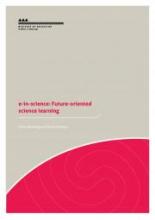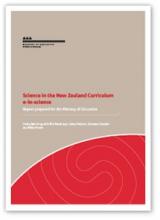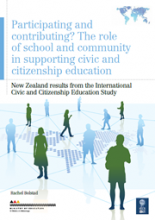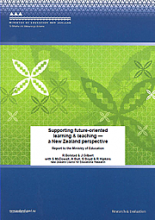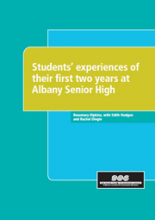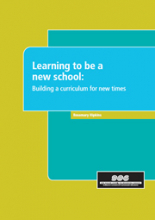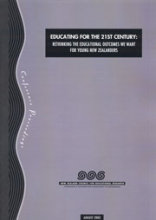NZCER's Schooling for the future work
You are here
Schooling for the future
Recent Schooling for the future research publications
This New Zealand Council for Educational Research (NZCER) research project explores the ways five diverse secondary schools shaped their timetables to support innovation in teaching and learning. The timetable is often a taken-for-granted presence in schools even though it plays an important role in how teaching and learning are experienced. This report identifies key factors that schools may find useful to consider when making changes to their timetable.
How can education in Aotearoa New Zealand respond to climate change?
This report presents findings from a case study of Owairaka District School's collaboration with their community as part of the Garden to Table programme and other initiatives.
This report presents findings from a case study at Pakuranga Intermediate on their collaboration with a group of performing and visual artists in 2012-2014. It's part of a wider NZCER investigation into successful and sustained collaborations between schools, communities and professional experts.
The term Education 3.0 is used to signal the shift from traditional schooling to more appropriate models for the 21st century. This work was carried out for Te Aho o Te Kura Pounamu - the Correspondence School - to scope possible new metrics they could use to document student learning and teacher practice to support that learning.
The full report is available here.
This is the submission from NZCER's Research team on the Update of the Education Act. It draws on NZCER's deep expertise, particularly in curriculum and assessment, school leadership and governance, and future-focussed education, to respond to the discussion document.
This 2015 report updates the findings from a large multi-method study of environmental education in New Zealand schools, done in 2002-2004. The update report will be of interest to schools and environmental education providers and stakeholders who support schools.
This discussion document was developed in 2013 to support teachers and others to engage with findings from the e-in-science research project, carried out by the University of Waikato and the New Zealand Council for Educational Research under contract to the Ministry of Education.
This paper discusses challenges and issues arising from NZCER's future-focused programme of research. It takes learning itself as an idea worthy of critical scrutiny and addresses some of the tensions that differences in views about learning create for future-focused research.
This working paper sets out some of the early findings from a pilot project to explore the qualities that future-oriented teachers might need and how those qualities might be developed.
This exploratory study considers the feasibility of measuring the "international capabilities" of New Zealand students in Years 12-13.
This new free "rapid prototype" resource will be of particular use in school staff professional development workshops, and can also be used or adapted for use with students, parents, school Boards of Trustees, and anyone with an interest in what and how young people learn, and how education could be organised in the future. It invites groups to explore their current thinking and to imagine alternatives that provoke new questions about knowledge, and the roles, relationships, and structures that are needed to support future-oriented learning.
How can educational research could contribute to the development of a more future-oriented learning system? This article discusses an attempt to synthesise ideas from the “21st century learning” literature with current knowledge about practice issues and future possibilities for innovation in New Zealand education, in order to distil a set of principles for a more future-oriented system. We hope this synthesis might provide a platform for educators, researchers, policymakers, and other stakeholders in education to engage in ongoing discussion about how to develop “next practice” and achieve system change.
This article has been published in the journal Teachers and Teaching, Theory and Practice later this year. It reports on the factors that continued to sustain the initial commitment of a group of 57 primary and secondary teachers who had been identified early in their careers as individuals showing “promise” and who were predicted to make a significant contribution to teaching.
This paper makes the case for deep and radical change to New Zealand's approach to science education. It discusses the implications of recent science education research and policy work, and argues New Zealand still has a long way to go to developing a future-oriented science education system. It explores what needs to change and contains suggestions for some first steps.
This report looks at how Year 9 students experience civic and citizenship education in the school curriculum, and the opportunities they have to develop citizenship competencies through participating and contributing to various aspects of school life. This includes co-curricular activities, which are those undertaken in the school environment but beyond formal classroom teaching and learning.It also includes decision-making about how things
happen in their school. The report also looks at the role of home and the community.
A new report by NZCER senior researcher Rachel Bolstad and chief researcher Jane Gilbert aims to set out a vision of what future-oriented education could look like for New Zealand learners. The work was commissioned by the Ministry of Education to inform its programme of work. and contains a foreward by the Minister of Education Hekia Parata. The report discusses new thinking and innovative practice in this field and synthesizes more than 10 years of research on future-thinking in education.
Albany Senior High School (ASHS) is a new senior secondary school intent on developing a curriculum for the 21st century. At the end of 2009 and 2010, its first two years of existence, it surveyed students on the learning approaches at the school. In this report, NZCER analysed the responses.
This report documents the beginnings of a new senior secondary school, set up with the aim of doing things differently for the 21st century. It discusses four key aspects of curriculum innovation at the school and explores its approach to learning and problem-solving through the lens of complexity theory.













